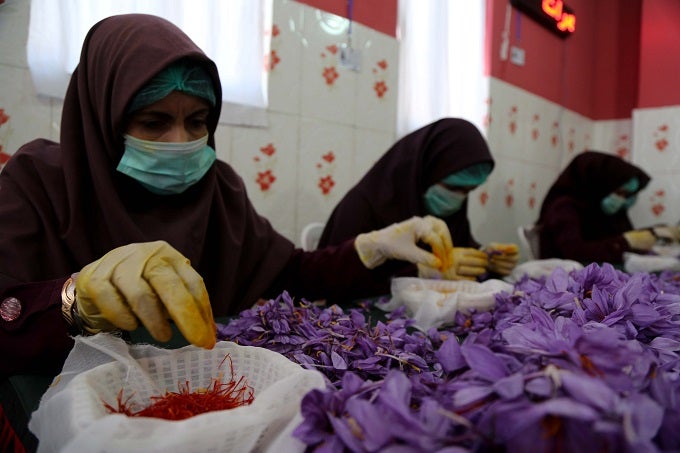
Meet Mohammad Naim, a saffron farmer in Afghanistan’s Herat province. In 2013, Naim launched a new business, the Taban Enterprise Group after he and his partners received training and attended agriculture fairs nationwide.
Taban cultivates, processes, and markets saffron, and since its founding, it has steadily improved the quality of its saffron and expanded operations. Today, the company employs 120 women annually for seasonal work to harvest and process the valuable crop .
This business success story started with small savings pooled together by rural men and women like Naim .
Since 2010, the Afghanistan Rural Enterprise Development Project (AREDP) has linked rural producers with markets and helped villagers form savings and credit groups to create businesses or expand their small enterprises.

AREDP is a program of the Ministry of Rural Rehabilitation and Development, started in 2010 that aims to increase employment opportunities and the incomes of rural populations. It receives funding support from the International Development Association (IDA), the World Bank Group’s fund for the poorest countries, and the Afghanistan Reconstruction Trust Fund (ARTF).
In the last four years, villagers took loans from their saving groups and set up 1,300 micro-enterprises, which sold about $7.9 million in local markets through AREDP-supported small and medium enterprises (SMEs).
Together, these small and medium enterprises (SMEs) have garnered $58.6 million in sales in the last two years and reached provincial, national, and international markets. Considering the World Bank and ARTF invested $39.9 million in support of savings groups, micro-enterprises, and SMEs, the sales returns are 1.6 times more than the investment.
In villages across five provinces (Balkh, Bamyan, Herat, Nangarhar, and Parwan), the project has created 110,000 jobs and about 17 percent of the SMEs are former AREDP-supported micro-enterprises that have successfully scaled up their business.
Reminiscing about his humble beginnings, Naim noted that he started as a small enterprise owner. “But after AREDP supported me,” he said, “I have become a nationwide entrepreneur. From not being able to cover my own family expenses to an annual income of 400,000 afghanis (about $6,000) is a dream come true, and I have AREDP to thank for making this happen.”
Moreover, AREDP has helped employ and empower women. Fifty-five percent of saving group members are women, and almost 70 percent of loans have been taken by women to set up enterprises in their villages . In Herat, 63 percent of saffron enterprise group members are women .

This is no small feat in Afghanistan’s fragile context and, to be successful, AREDP structures its technical, training and logistical support around five principles :
1. Social mobilization
AREDP mobilizes rural men and women to form savings groups . Around 10 men or women pool their savings together and form a group overseen by male or female village facilitators. The savings follow Islamic financing. The Project does not provide a matching grant The Groups learn self-help and use local resources.
With small funds now available in their villages, men and women take small loans to start their local micro-enterprises in agriculture, livestock, food processing, handicrafts, or carpets ,
AREDP works with start-up micro-enterprises and supports them to develop and expand their business through assistance in such areas as accounting, banking, planning, leadership, and investment.
3. Enterprise group aggregation:
The micro-enterprises are clustered by sub-districts and or districts level by commodity to reach economies of scale and attracts prospective buyers.
4. Support to small and medium enterprises (SMEs)
AREDP also works with small and medium enterprises in districts and cities. In a fragile country with few private sector partners, the project builds SME capacity through business development, exposure visits, and participation in national or international fairs. AREDP currently supports 544 SMEs, including former micro-entrepreneurs who graduated to become cluster or district-level SMEs. They account for 17 percent of AREDP-supported SMEs.
5. Supply chain development
AREDP also supports supply chain development for the SMEs and links rural producer or micro-entrepreneur clusters with SMEs. For instance, 1,345 saffron micro-entrepreneurs are working with 256 SMEs in Herat .
These linkages are going beyond mere market linkages. SMEs are increasingly being contracted as Business Development Service Persons (BDSPs), working directly with micro-entrepreneurs. They can provide market-driven extension services, specs, and quality control. Twenty-three percent of BDSPs are currently project-supported SMEs.
The blog was developed as a part of knowledge and learning series of World Bank’s Global Solution Groups – Jobs- Agriculture Global Practice.



Join the Conversation